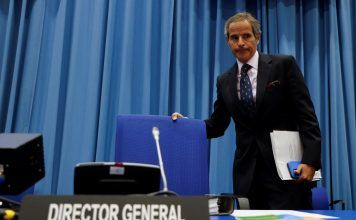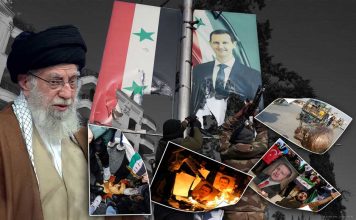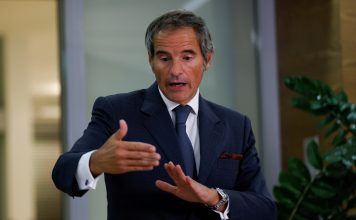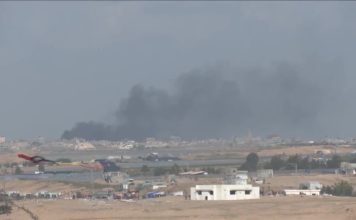By Ahmad Rafat
Prince Reza Pahlavi presented his “new covenant” in a live broadcast. He said his speech was a “response to the innumerable messages of those of you who are rightly worried about Iran and its future.”
He said his motivation was “to establish a system in which power is never monopolized by one individual or one group. Every Iranian across the country, irrespective of gender, ethnicity, religion, ideology, lifestyle, must accept responsibility and share equally in decision making in their future and that of the country. One-man rule and pyramidal power structures, in today’s world, are not sufficient to meet the needs of a pioneering and dynamic society.”
Shahriar Ahy, the spokesperson for the Iran Transition Council, said the Prince wished to “extend his hand out to all factions of the opposition. He highlighted the fact that their shared goal of replacing the theocracy with popular sovereignty was far more urgent and important than their differences.”
“Although [that statement was] important, it was not new,” Mr. Ahy said. “The problem has been that republican forces’ retort is always: ‘Why you?… you represent the monarchy, an institution that endows a person with special privileges.’”
Shahriar Ahy added: “What was new in his statement was the Prince’s clearly expressed opposition to the concentration of power in [the hands of] any particular individual or special group, emphasizing the need for a New Pact in which all Iranians discharge shared responsibility for their future in equal measure.”
Abdullah Mohtadi, Secretary General of the Komala Party of Iranian Kurdistan, reacted positively to the speech.
“In my opinion, this particular address of Mr. Pahlavi as well as his overall efforts are positive and in line with those of other forces within the democratic opposition seeking a real transition from the Islamic Republic,” he said. “To expand and strengthen these efforts, issues such as the decentralization of the political structure, the creation of regional bodies and assemblies, and education in the mother tongue will prepare the ground for a real and concrete dialogue.”
Dr. Ata Hoodashtian, an Associate professor of political science at Swiss UMEF University in Geneva, also said a crucial point of this speech was “that power is no longer the monopoly of one individual.”
“Also, a pyramidal structure of power, whether in a monarchy or a republic, is no longer valid, as such. The alternative to the current regime is a democratic government.”
Mr. Hoodashtian said it was very important to hear Prince Reza Pahlavi remark on “the convergence between all forces to save Iran,” and this was a point which he thought would please all political parties and groups.
In an interview from Tehran, Kourosh Zaim, leader of the Iranian National Front (Sixth Saman), told Kayhan Life: “For the first time, Mr. Reza Pahlavi delivered a comprehensive and political speech, reaffirming his prominence among the opposition. However, he did not offer a practical way forward and his position and status in any future equation for Iran, remains unclear.”
Ammar Maleki, Assistant Professor of Public of Law and Governance at Tilburg University, and son of Dr. Mohammad Maleki (member of the Council of the Religious-Nationalist Coalition, and the first dean of the University of Tehran after the revolution) said he considered the Prince’s “new covenant” important, because it put emphasis on “tolerating each other’s views and opinions, trying to establish a system in which power is never the prerogative of one individual or group, and extending a helping hand to all pro-democracy forces. A good roadmap. I hope it will prove to be practical.”
The Iranian Fighting Students Movement, based in Tehran, welcomed the “new covenant” for promising “bright ideas and a bright future for our Iran.”
They added in a message to Prince Reza Pahlavi: “Your message is a most important pact with Iranians, because you asked the people of Iran to save Iran.”
In his speech, Prince Reza Pahlavi also sent a message to the Iranian Army and the ranks of the Iranian Revolutionary Guards (IRGC) and the Basij (The Islamic Militia).
Speaking to the Army, he said: “To my compatriots in the army, I say: your responsibility, as soldiers of this nation, is to defend our nation’s territorial integrity. Our nation which, with the zealous sacrifice of its most gallant youth has, until this moment, survived. Today as the Islamic regime, to maintain power, auctions off our land and sea to foreigners and fires upon our defenseless people, your responsibility more than ever before is the defense and protection of the Iranian nation in the face of this oppressive regime.”
In his message to the ranks of IRGC and the Basij, he said:
“I ask: don’t you see that the so-called generals of the IRGC are only after generating wealth through corruption and crime, and that wealth and power has been monopolized by a small group of thieving clerics and commanders? Don’t you see that the IRGC’s meddling in all aspects of people’s lives and all of the nation’s affairs has paralyzed the country, and Basij and IRGC have become forces opposed to the people and the nation? Look into the eyes of your own children and see how their futures are being held hostage by the personal interests of a corrupt few. Your children ask you: on which side do you stand?”
An Army officer in Tehran told Kayhan Life: “Addressing the IRGC and the Basij, Prince Pahlavi says that the commanders seek to accumulate wealth, money, and power. They will not change their conduct simply based on advice. Armed and ruthless, they have no understanding of peaceful protest or human rights. They cannot be confronted empty-handed. We all know that armed confrontation with the regime means escalating violence. In the end, the decision must be determined on the ground. What is the solution?”
Mr. Ahy said he considered the message to the Army and the IRGC to be very important: “Responding to doubts that much can be done and the fear that a regime from the dark ages could still prevail through armed suppression, the Prince called on the Army to support the people in their quest for freedom. Interestingly, he did not say the same about the Revolutionary Guards as a whole, but addressed the “body” of the Guards, which excludes the top echelons — those willing to kill to preserve their fabulous wealth and privilege amidst a sea of poverty and despair.”
Prince Reza Pahlavi asked the people inside Iran and the political forces abroad to unite their forces: “We will either steer this storm-battered ship to safe shores together, or we will all drown separately.”
He added: “The path to victory is clear: we must connect strikes, protests, and civil disobedience in various parts of the country to one another. In the workplace and in neighborhoods, we must form small protest circles, and we must promote civil disobedience in all its forms. We must assist the families of strikers and political prisoners. Street level and middle level protest leaders, especially those who are currently imprisoned, must not be forgotten. Iranians abroad, by sharing the message of those at home and when possible with financial support, must act on their patriotic duty.”
Mr. Zaim disagreed with this “path to victory.”
“Reza Pahlavi should appreciate the risks and dangers involved if there is to be another Aban 98 [a reference to the 2019 protests]. This time around will be much more violent. More lives will be lost because of the Islamic Republic leaders’ violent and cruel nature. They will become more dangerous and savage when they see their backs to the wall.”
Hasan Hezarmeidani, a labor union activist in Karaj, near Tehran, said he appreciated the Prince’s invitation to connect strikes, protests, and civil disobedience. He told Kayhan Life: “The Prince’s message is very clear about the need for unity around strikes and civil disobedience, exactly what we need today. We must connect and unite every pocket of civil disobedience and protests taking place among various sectors and classes of the Iranian society. As the Prince said we will either bring this storm-tossed ship to a safe shore together or we will each sink separately.”
Zartosht Ahmadi Ragheb, a political prisoner currently free on temporary release, told Kayhan Life: “The people of Iran today need more and more hope to cross this dark path of authoritarianism. Reza Pahlavi’s message in the New Covenant is undoubtedly hopeful, because it speaks of the unity of forces and rejects the monopoly of power and dictatorship. At the same, the role of anti-authoritarian forces in bringing about solidarity and coordinating their activities around this pivot can be constructive and effective.”







